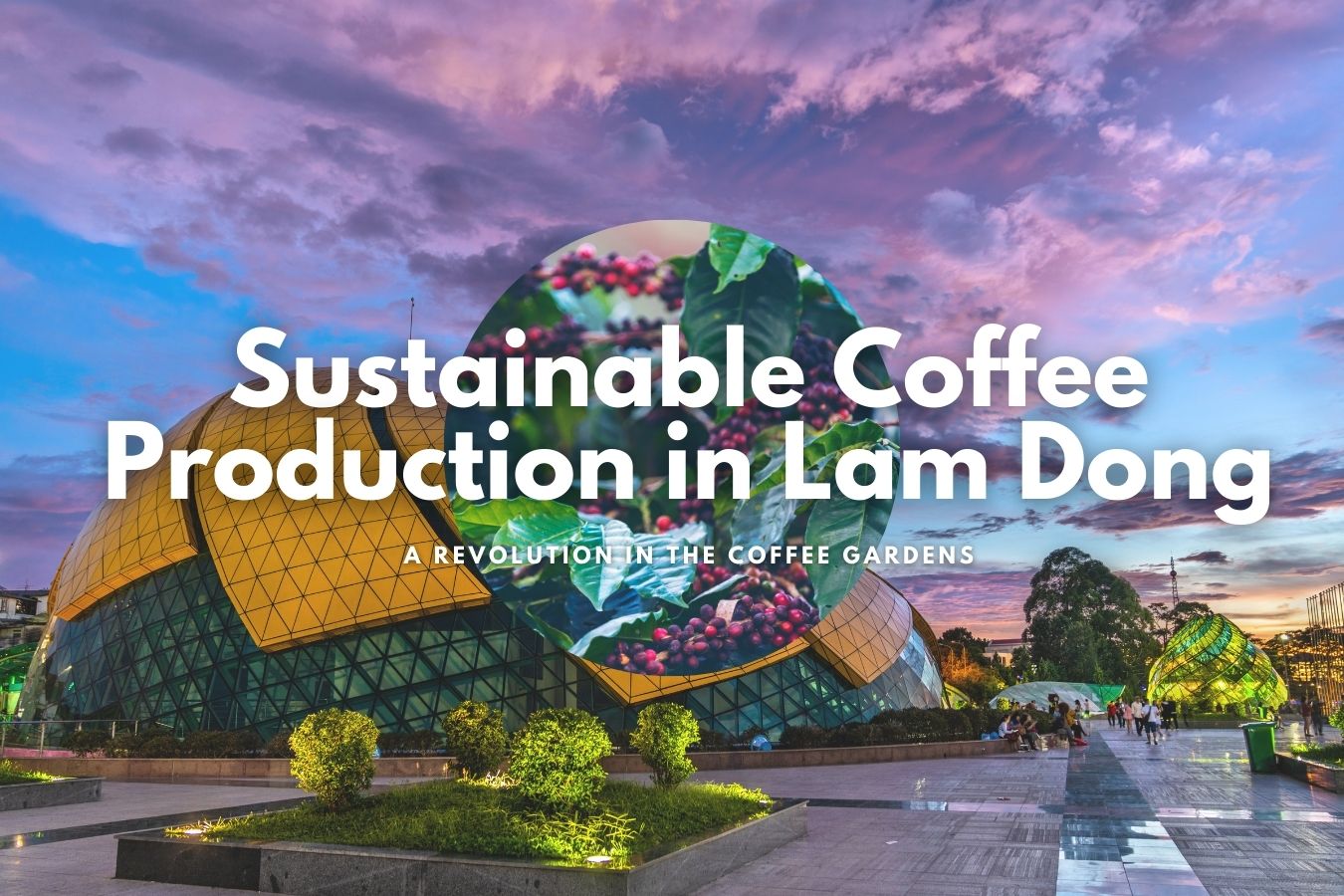
Sustainable Coffee Production in Lam Dong: Coffee growers in Lam Dong, Vietnam, have embraced innovative cultivation techniques and high-quality varieties to improve product quality and value. By following standard procedures and incorporating new varieties, these farmers are transforming the coffee industry in the region.
Bui Trung Dang’s family (A coffee farmer model of Helena Coffee Vietnam) recently enjoyed a bumper coffee harvest in Tan Nghia commune, yielding over 4 tons of kernels per hectare. Dang adopted high-quality, disease-resistant seeds and a standard farming process recommended by the local agricultural industry to boost productivity. This resulted in a 98% plant survival rate and a significant increase in yield.
The Nam Ban Agricultural Cooperative in Lam Dong province has also seen improvements by installing an efficient irrigation system and adopting a sustainable coffee model that incorporates economically valuable crops like avocado, macadamia, and durian. This has reduced input costs while increasing profits and income stability for the cooperative’s members.
Organic coffee production is another value-added strategy being pursued in Lam Dong province. Trinh Tan Vinh, a coffee farmer in the Di Linh district, switched to organic production in 2008. Vinh has saved on weed-killing and herbicide costs by implementing an organic agricultural process while improving coffee quality and yield. His organic honey coffee brand is now sold domestically and internationally.
Similarly, a group of farmers in Hoa Bac commune, Di Linh district, have embraced an organic coffee model in a 5.6-hectare area. By avoiding chemical pesticides and fertilizers and relying on agricultural by-products for fertilization, they have increased the quality and competitiveness of their coffee, ultimately leading to higher market prices.
Lam Dong province is implementing an organic agriculture project focused on green and circular agriculture. Coffee is an essential crop in the region, and the area prioritizes developing sustainable models emphasizing high-quality varieties and scientific processes. The local Department of Agriculture and Rural Development encourages farmers, businesses, and cooperatives to build specialty coffee and invest in processing to add value to their products.
Lam Dong province ranks second in coffee production in Vietnam, with about 176,000 hectares dedicated to the crop. Coffee products from Lam Dong, including roasted and ground coffee, are being exported to European and Asian markets. In 2022, the province is expected to ship over 90,000 tons of green coffee, valued at over $180 million. Helena Coffee Vietnam is one of the companies contributing to this revolution in the coffee gardens of Lam Dong.
As the coffee revolution continues in Lam Dong, farmers, and cooperatives are exploring new ways to enhance their coffee production’s quality, sustainability, and profitability further.
One promising approach is the adoption of precision agriculture techniques. By utilizing technology such as drones, sensors, and data analytics, farmers can monitor their coffee plants’ health, optimize irrigation, and manage pests more effectively. This can lead to improved resource management and increased yields while minimizing the environmental impact of coffee cultivation.
Another trend gaining traction is direct trade between coffee farmers and roasters or retailers. Farmers can receive higher prices for their beans by cutting out intermediaries, while roasters and retailers can access high-quality, traceable coffee. This approach fosters stronger relationships and a better understanding of the coffee supply chain, ultimately benefiting producers and consumers.
Moreover, collaborations between local farmers, research institutes, and government agencies can help accelerate the adoption of innovative farming practices and the development of new coffee varieties. By sharing knowledge and resources, these partnerships can drive the growth of the coffee industry in Lam Dong and other coffee-growing regions.
The expansion of agritourism also presents an opportunity for coffee farmers to diversify their income sources. By inviting tourists to experience the coffee cultivation process first-hand, farmers can generate additional revenue while promoting local culture and traditions. This, in turn, can contribute to the region’s economic development and create a positive feedback loop where thriving coffee production supports local communities and attracts more visitors.
In summary, the coffee revolution in Lam Dong is just beginning, with numerous opportunities for growth and innovation. The region can continue transforming its coffee industry through sustainable farming practices, organic production, precision agriculture, direct trade, collaborative efforts, and agritourism, benefiting farmers and consumers worldwide. Helena Coffee Vietnam and other local companies will undoubtedly play a significant role in shaping this bright future for Lam Dong’s coffee sector.
References:
- Nông nghiệp Việt Nam, Cà phê cảnh quan, nhìn từ xã Đăk Krong, Date published April 25, 2023